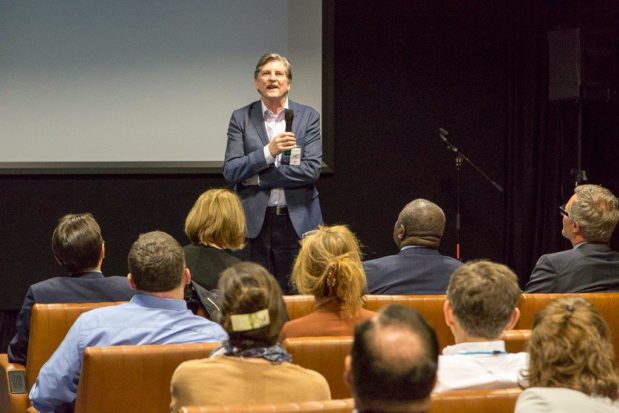

On 10 April 2017, the VCDNP and the Preparatory Commission for the Comprehensive Nuclear-Test-Ban Treaty Organization (CTBTO) jointly hosted a screening of the newly released documentary "Where the Wind Blew" about nuclear weapons testing in Kazakhstan and the United States. The screening was followed by a panel discussion featuring Lassina Zerbo, the Executive Secretary of the CTBTO, André Singer, Director of the film and CEO and Creative Director of Spring Films Ltd, and Andrew Weber, Senior Fellow at Harvard Kennedy School's Belfer Center and former US Assistant Secretary of Defense. Laura Rockwood, Executive Director of the VCDNP, moderated the discussion.
"Where the Wind Blew" narrates the horrors of the Soviet and US nuclear-weapons testing and the damage it has inflicted upon the health of populations living around or downwind from the testing sites in Kazakhstan and the United States. It also tells the story of the popular anti-testing movement that brought together victims and activists from the two countries and helped achieve the closing of the Semipalatinsk nuclear test site. The film serves as a stark reminder of the grave humanitarian impacts of nuclear weapons and implicitly underscores the importance of achieving the entry into force of the Comprehensive Nuclear-Test-Ban Treaty (CTBT).

Ambassador Kairat Sarybay, Permanent Representative of Kazakhstan to the International Organizations in Vienna, attended the event and noted that such an emotional documentary spoke for itself and that further explanation of Kazakhstan’s advocacy of a nuclear test ban was not required.
André Singer shared with the audience his shock of how little the general public knew about nuclear testing and that the need to tell the story of the people most affected motivated him to make the documentary. His ambition, however, was not to influence policy directly through his work, as he believes the general public should be the ones putting pressure on governments to prevent the resumption of nuclear testing.
Lassina Zerbo encouraged wide dissemination of the movie and emphasized the need to educate the next generation on the importance of stopping nuclear tests worldwide. Zerbo mentioned that either Israel or Iran could potentially be the next country to ratify the CTBT and underlined that there had certainly been a positive change in China’s attitude towards the CTBTO. However, any steps forward are very often accompanied or followed by a step back. For this reason, Zerbo believes that the international community should focus on practical measures and voiced concern that negotiating new treaties, such as one prohibiting nuclear weapons, should not be at the expense of the CTBT.

Andrew Weber stressed the importance of the CTBT and expressed the belief that, in the long run, the Treaty will enter into force. He added, however, that the status quo is not acceptable, due to the increasing risk of use of nuclear weapons, whether intentional or accidental. Weber reassured that the United States does not need to resume nuclear testing as it has committed not to develop new nuclear weapons. At the same time, he noted the re-emergence of discussion in the United States of the need for new types of nuclear weapons and the associated need for testing. Weber underscored that partners and allies of the United States should discourage it from making irreversible mistakes by adopting the calls for new nuclear weapons as policy.
The screening was held in conjunction with the launch of the special edition of The Nonproliferation Review, a journal concerned with the causes, consequences and control of the spread of nuclear, biological and chemical weapons. The special edition is dedicated to the 20th anniversary of the CTBT. The publication was coordinated by the VCDNP in cooperation with the CTBTO.